The Worlds We Invest In: Building Economy and Community in St. Louis and Honduras
July 9, 2021
The Worlds We Invest In: Building Economy and Community in St. Louis and Honduras
By Patrick Clapp
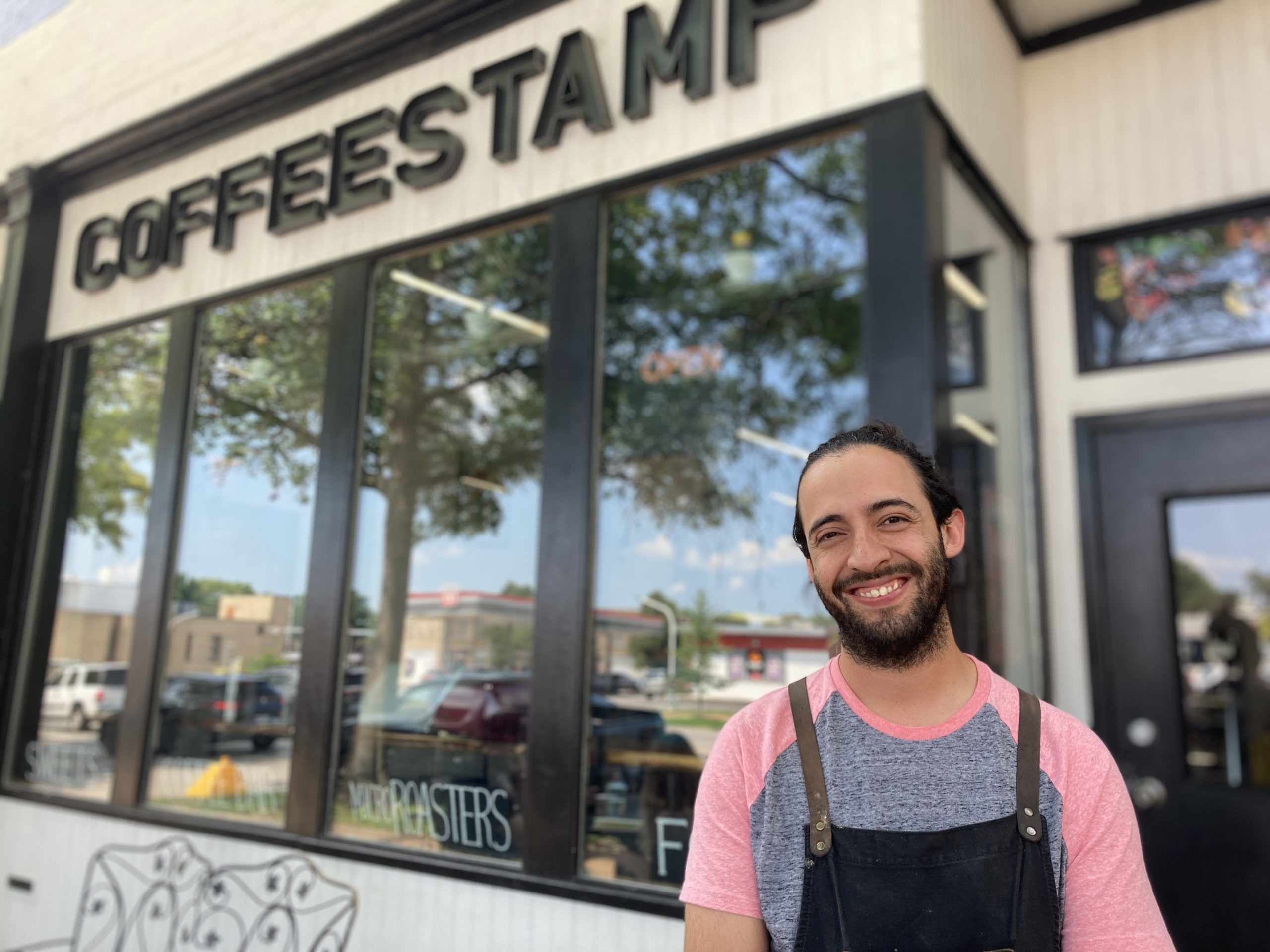
Patrick Clapp is co-founder of Coffeestamp coffee roaster and café, and a current participant in the WEPOWER Accelerator program. Photo by Whitney Bembenek
Different people are exposed to different worlds, and at times there is overlap. There’s a world where people have everything they need in their house and more, and they will always have it and won’t think twice about it. And there’s another world where people struggle regularly to get their basic needs met, to have water, electricity, and opportunities to be educated and grow. For example, when I came to the U.S., I found out that there isn’t any question about having water and power in your house, right? In my home country, however, more than half of the people don’t have access to clean water on a daily basis.
I grew up in the countryside of Tegucigalpa, Honduras, which is among the mountains and very beautiful. There are no grocery stores nearby or places for higher education, and just having water coming through your pipes is a blessing. I’ve been living in St. Louis for a handful of years now and growing my business, yet it is very hard for me to deny all that I came from, you know? I will always try to give back.
My brother and I were born and raised by my mom and have dual citizenship in the U.S. My dad is from Connecticut and met my mom when he was backpacking in Honduras. They fell in love, got married, and had my older brother and I. A few years after I was born, however, they split and he eventually moved back to the United States. So many children in Honduras are raised by single mothers, and when I was growing up, there weren’t any laws in place to enforce child support in single parent households. As you can probably imagine, Mother’s Day is a very important holiday there.
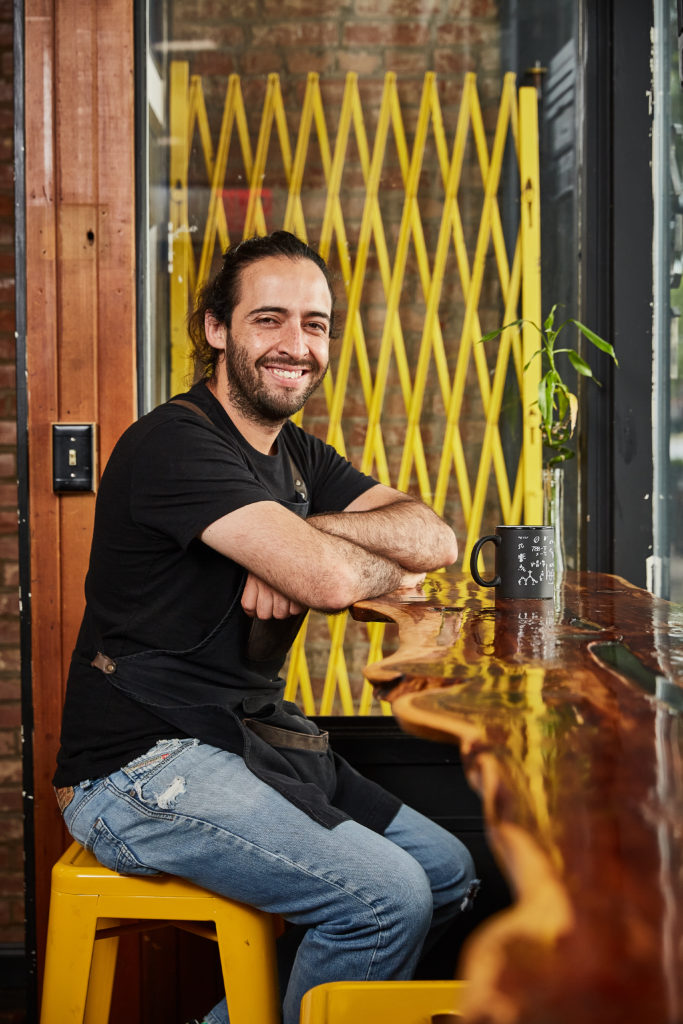
Photo by Izaiah Johnson
My mom is one of my biggest motivations. Growing up, we were poor. We didn’t have a car, public transportation was almost nonexistent in the rural area where we lived, and every day our mom had to wake up at 4am to catch the only bus that would get her to her 7am job. She would do this every day for as long as I can remember. Also, my maternal grandma was an orphan and super poor, and she became a nurse. Man, she worked like hell. It’s so admirable how a human being can be so strong and help others. I want to create something better for us, too-- for my family and my communities.
In Honduras, I didn’t go to the best schools, but I was good at reading and figuring things out. My brother and I had always dreamed about owning a business together, and some of our friends lived on farms and grew coffee. We liked the idea of forming a partnership with them; helping them, helping us. I went to college for a few years in Chile to study business management, and when I returned to Honduras, the political and economic situation there was really rough. My uncle in Connecticut offered to bring me to the United States to help him with a housing project for a month and also to be close to my Irish grandma for her birthday, and I accepted. My Grandma’s the one that named me, by the way; I’m a Honduran guy with a fully irish name.
After helping my uncle, my brother joined me in the U.S. and we worked in construction in other states. At one point, our construction crew came up to St. Louis for a big project and we happened to arrive in the fall. I had never seen fall colors before and found it so beautiful and enticing to stay near. Once the big construction project was complete, my brother and I stuck around and began to grow the entrepreneurship dream we had together, pairing it with our desire to bring our Honduran friend’s coffee to the United States.
For four years, my brother and I educated ourselves about the coffee industry and everything related to it, and then in 2018 we committed. One day, I drove 16 hours to northern Wisconsin and back to pick us up a coffee roasting machine. Soon thereafter we found a small spot to rent above an auto glass tinting shop in the Fox Park neighborhood and started our coffee roasting business, Coffeestamp. The size of the space and price were right for us, but much of the area was pretty bare. On our block was Trader Bob’s Tattoo Shop, a bit further down was a convenience store, and not much else. Empty buildings and no foot traffic. In the space we leased it was just us two brothers, the coffee, the roasting machine, a couple tables, and that’s it. Some friends thought we were crazy and that this would be a waste of money. Others thought that we could “bring our own vibe.” It was definitely a bumpy beginning with lots of frustrating moments, but we kept going.
In March 2019, we began to sell our coffee at the Soulard Market and online. Then last year, our second year, we tripled the amount of coffee we roasted and opened a storefront with indoor and outdoor seating. Now in our third year, we have our coffeeshop running where we bake and sell foods like empanadas and sweet alfajores, and we’re doubling our coffee roasting numbers from last year.
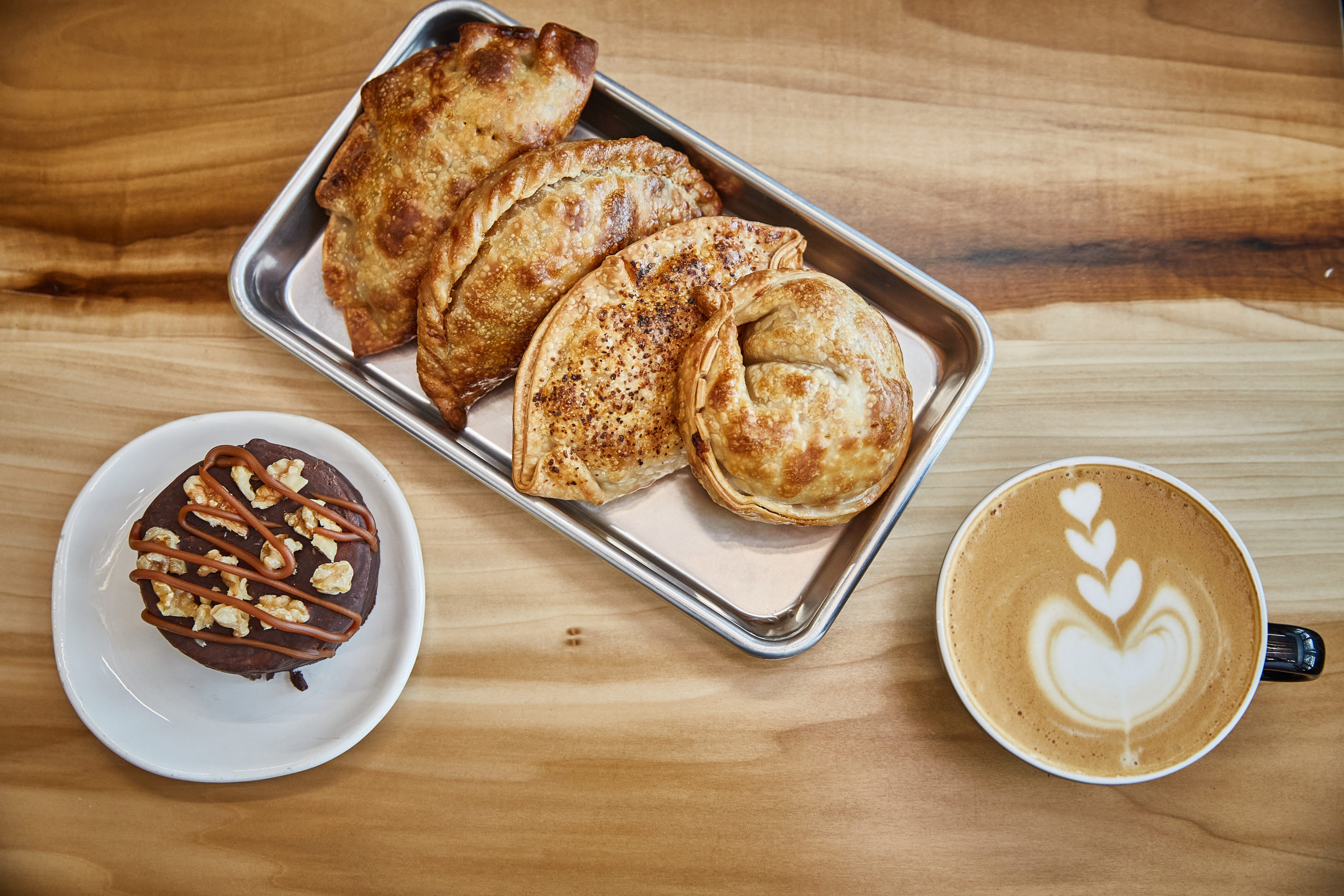
Made in house: Alfajores, Empanadas, and of course, house-roasted coffee drinks. Photo by Izaiah Johnson
The first weekend we opened our storefront in August 2020 was amazing. People were walking down the street, stopping in, shopping and thanking us. There was such a lack of places to gather in this area, and lots of people have to travel far to get what they’re looking for. So much of the money in St. Louis has been going to certain parts of the city without a lot going elsewhere, and you don’t need to be a tax expert to see that a huge portion of the city’s taxpayers haven’t seen their money come back to their neighborhoods. People are so happy that we’ve created a spot where neighbors can just grab a cup of coffee or stay and have a conversation. And now, we’re getting so busy! I once told my grandmother: Never in my wildest dreams did I see us opening a thriving coffee business and helping build the community like this. I never saw it coming.
Because our storefront is near the convergence of three different neighborhoods, it really draws people of different ages, races and socioeconomic statuses. It almost feels cosmopolitan to see it so diverse here. Our staff is diverse, our clientele is diverse, and in our shop everyone is treated the same. We’re not faking it and people can feel that. If someone doesn’t have the cash, we’re not gonna send them away when they could use a cup of coffee or a sense of community, you know? You never know what’s going on in people’s lives.
With COVID-19, there are folks that have been on lockdown the whole year, and probably by themselves with no family around. We may see people smiling, but we don’t really know what’s going on inside. A friendly smile and a “how are you doing?” can honestly change someone. Besides, smiles and conversation are free, and just being yourself and treating people with respect doesn’t cost too much either.
As our roastery and coffee shop get busier, we really want to stabilize ourselves in the community and contribute. We want our new employees to feel good, be well-paid, make quality products, and for customers to create good memories here. I’m part of the neighborhood association and want to grow our business and community as much as we can.
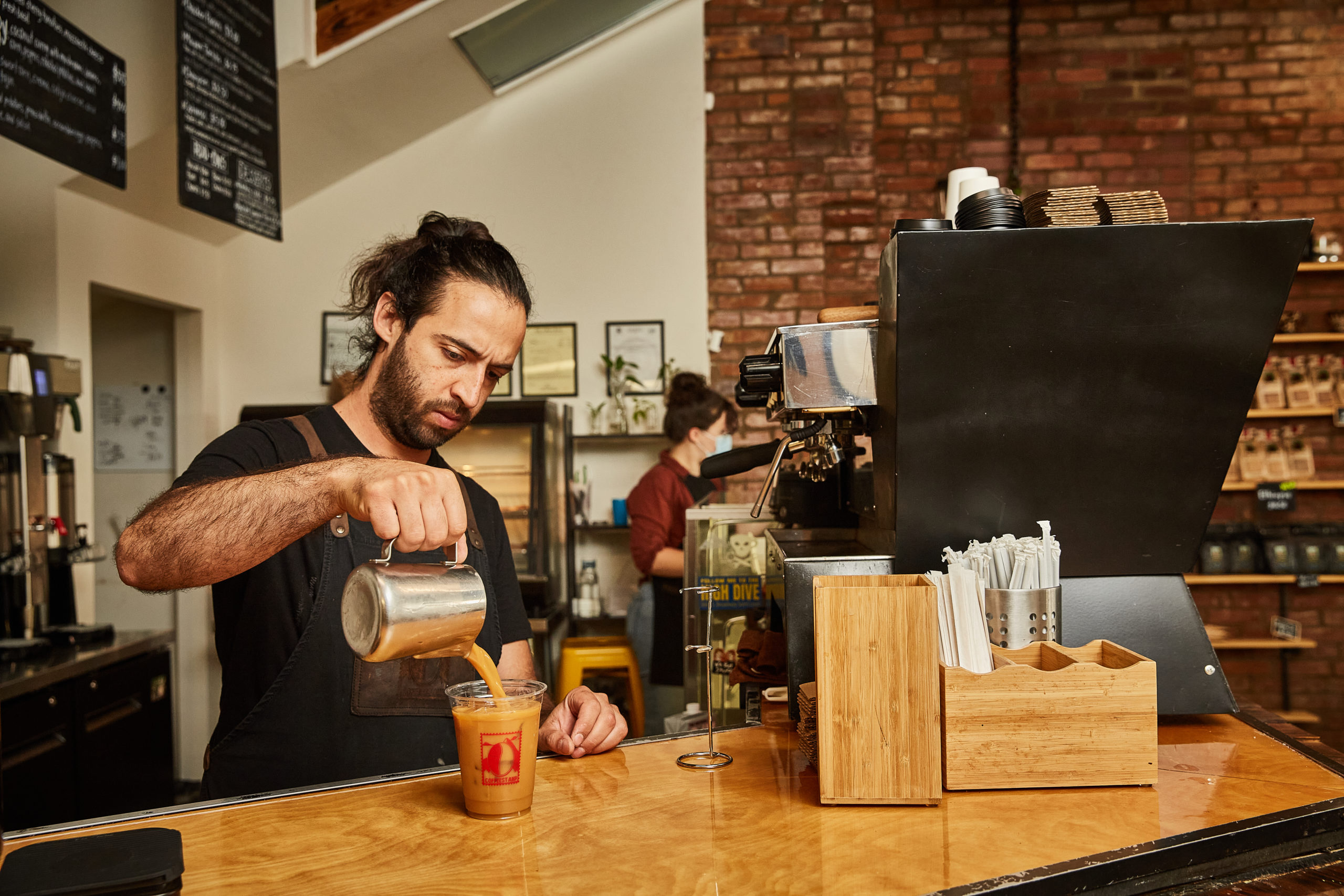
Photo by Izaiah Johnson
In the past few years that we’ve been here, we’ve really come to love our neighbors and see how much potential this area has. This is a historic area of the city, the buildings are awesome, and it’s easily accessible by the highways and close to downtown. Other great businesses and nonprofits are now coming into the area, too. We’re creating a solid block that one day can hopefully become a new district. We’re all pushing together, and I see it already happening.
One of the main reasons I wanted to get into working for myself was to have more time and create my own projects. We all have big dreams, but there’s a major difference between having something in your head and manifesting it. When I was working construction, I was working 60 hours a week, but now as an entrepreneur I work even harder and more hours! When I learned of the WEPOWER Accelerator program, the thought of adding another thing to my schedule seemed absolutely crazy. I’ve always believed, however, that more knowledge is power, and I liked the idea of being part of a network with others in a similar boat, so I joined.
The program offers so many things that make a lot of sense and I’m excited by it. It’s giving us access to information and practices for creating salaries, hiring employees and human resources, inventory, support for marketing, and much more beyond business fundamentals. I always strive to get better, and there are a lot of areas of business where these new tools and information can really help me grow.
And the fact that the program is focused on Black and Latinx people makes sense. I don’t try to focus on the bad, but try to focus on the best, you know? I see Black and Latinx people making great things happen every day, and what WEPOWER is showing us is that we can set examples and create big opportunities for the rest of the community. And there are people willing to support us on this journey.
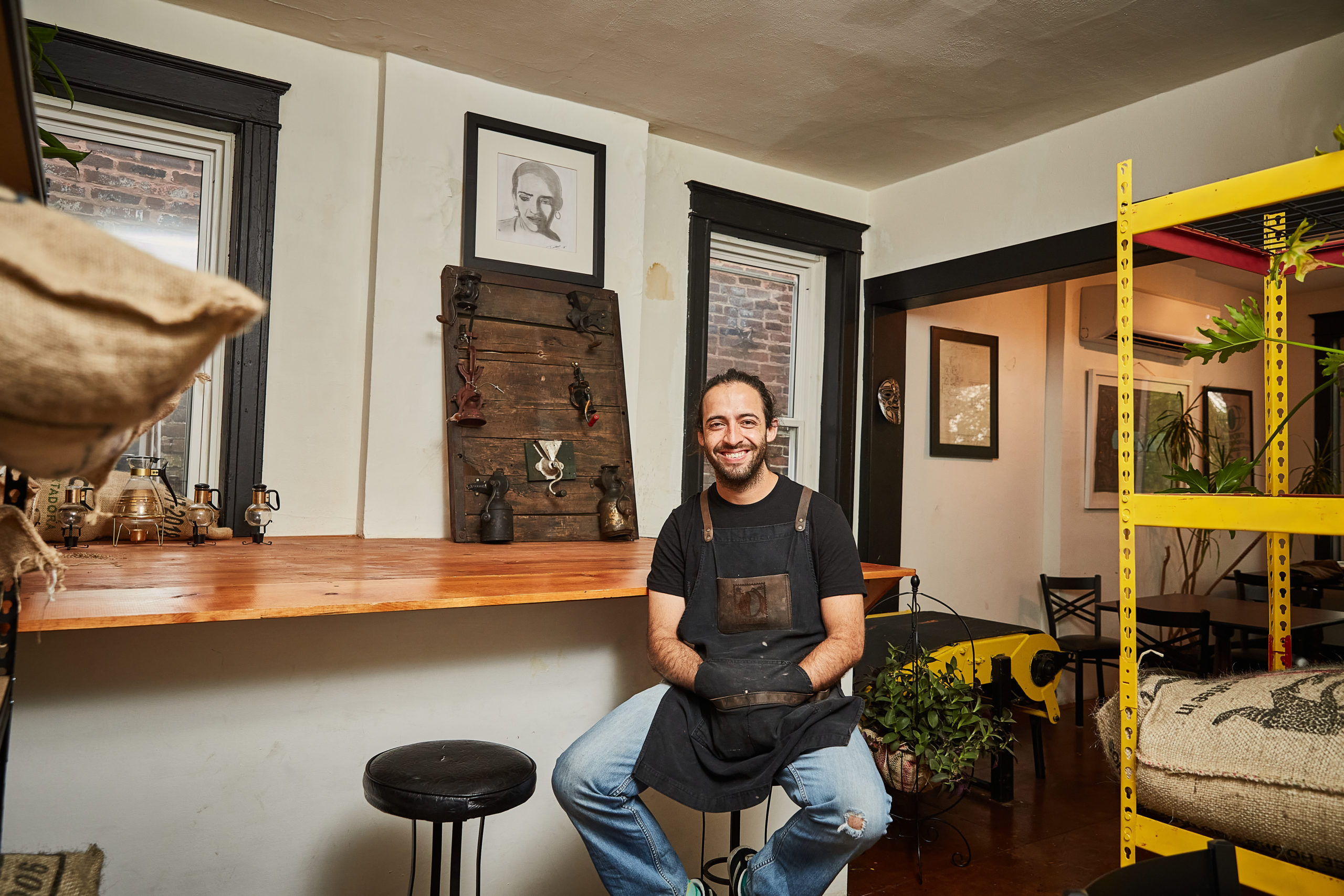
Patrick in the upper seating area of the café--a drawing of his mother hangs on the wall next to him. Photo by Izaiah Johnson
Coffeestamp’s next goal is to scale up into the building next door and have an exposed roastery, coffee bar, full menu, and larger commercial kitchen. We currently make about 100 empanadas a day and could definitely use more space! My largest dream, however, is to create our own sustainable farm back in our rural community outside of Tegucigalpa that will provide the coffee we sell here and improve the lives of people there. But we cannot just develop a farm, you know? It’s not that easy. We have to create a plan for a healthy economy--from improved streets, water, power, and definitely quality education starting at an early age. We want to start a school and get all of the children in the area educated up to at least high school level. It’s a whole structural plan that we have in mind, and we need to get more established here first, but it’s our dream for Coffeestamp’s profits to eventually circle back to support the future sustainable coffee farm, school and the other needs of our rural Honduran community.
Being a part of this growing neighborhood here in Fox Park and a contributor to its positive changes is a blessing to me, and getting to reinvest our profits into improving life and opportunities for people in the Tegucigalpa countryside is a win-win for both of my homes. We’re already in conversations to acquire land down there, and the farm will be named Finca Erlina Alicia, after my Irish and Honduran grandmothers.
When we make this project happen, we will transform so many communities--from Honduras to St. Louis.
Written in partnership with Whitney Bembenek.
